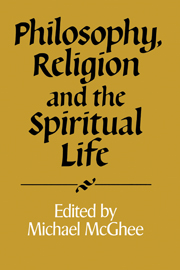Book contents
- Frontmatter
- Contents
- Introduction
- Philosophy and Religion in the Thought of Kierkegaard
- De Consolatione Philosophiae
- The real or the Real? Chardin or Rothko?
- Love and Attention
- Descartes' Debt to Augustine
- Visions of the Self in Late Medieval Christianity: Some Cross-Disciplinary Reflections
- Refined and Crass Supernaturalism
- Religious Imagination
- Moral Values as Religious Absolutes
- Revealing the Scapegoat Mechanism: Christianity after Girard
- Philosophy vs. Mysticism: an Islamic Controversy
- Non-Conceptuality, Critical Reasoning and Religious Experience: Some Tibetan Buddhist Discussions
- ‘Know Thyself’: What Kind of an Injunction?
- Facing Truths: Ethics and the Spiritual Life
- Notes on Contributors
- Index
Visions of the Self in Late Medieval Christianity: Some Cross-Disciplinary Reflections
Published online by Cambridge University Press: 04 August 2010
- Frontmatter
- Contents
- Introduction
- Philosophy and Religion in the Thought of Kierkegaard
- De Consolatione Philosophiae
- The real or the Real? Chardin or Rothko?
- Love and Attention
- Descartes' Debt to Augustine
- Visions of the Self in Late Medieval Christianity: Some Cross-Disciplinary Reflections
- Refined and Crass Supernaturalism
- Religious Imagination
- Moral Values as Religious Absolutes
- Revealing the Scapegoat Mechanism: Christianity after Girard
- Philosophy vs. Mysticism: an Islamic Controversy
- Non-Conceptuality, Critical Reasoning and Religious Experience: Some Tibetan Buddhist Discussions
- ‘Know Thyself’: What Kind of an Injunction?
- Facing Truths: Ethics and the Spiritual Life
- Notes on Contributors
- Index
Summary
In a volume devoted to philosophy, religion and the spiritual life, I would like to focus the later part of my essay on a comparison of two Christian spiritual writings of the fourteenth century, the anonymous Cloud of Unknowing in the West (1981), and the Triads of Gregory Palamas in the Byzantine East (1983). Their examples, for reasons which I shall explain, seem to me rich with implications for some of our current philosophical and theological aporias on the nature of the self. Let me explain my thesis in skeletal form at the outset, for it is a complex one, and has several facets.
Outline of the thesis
First, this comparison is I believe of some interest, historically and theologically, in its own right, for it witnesses to a fascinating divergence between Western and Eastern Christendom at this point, the West driving wedges between faculties in the self, the East arriving at a remarkable new synthetic view of the person. If I am correct, The Cloud, on the one hand, is one manifestation (one amongst the range of possibilities) of an emerging sense of optionality in the West in this period about what constitutes the ultimate locus of the self; the perichoretic co-operation of memory, understanding and will authoritatively found in Augustine, is, in various ways, rent apart disjunctively in the spiritual texts of this time.
- Type
- Chapter
- Information
- Philosophy, Religion and the Spiritual Life , pp. 89 - 104Publisher: Cambridge University PressPrint publication year: 1992
- 1
- Cited by



